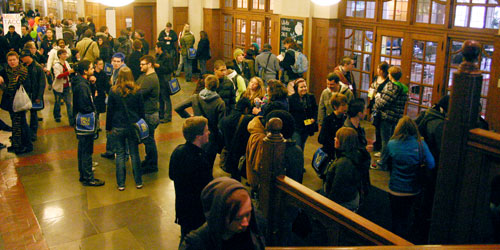By Lucy Hough

ANN ARBOR –
This year's Midwest Bisexual Lesbian Gay Transgender Ally College Conference, which took place at the University of Michigan from Feb. 25-27, attracted 1,500 attendees. The conference theme, "justice or just us," was promoted through workshops and keynote speakers, encouraging the audience of mostly college students to act on change.
The activities of the conference provided a safe place for attendees, according to Mandy Klein, a coordinator for the Alliance of Queer and Ally Students at Michigan State University. She said that students who attended the conference for the first time were enthusiastic about the opportunity to be themselves.
"They really appreciated what it might feel like to be in a world where we didn't feel any prejudice anymore, and I felt that was a really awesome experience for them to have," Klein said.
Klein, on her third MBLGTACC conference, said she appreciated the political emphasis of the "justice or just us" theme.
"It was nice that this time there were a lot of workshops that focused on achieving equality for all and sometimes in alternative ways, not ways that we think of right away," Klein said.
Conference speakers stressed the importance of activism. Mara Keisling, founder of the National Center for Transgender Equality in Washington, D.C., said that people are most effective toward change if they act for equality, rather than just talk about it.
The final speaker at the closing ceremony, Kris Hayashi, co-executive director of the Audre Lorde Project in Brooklyn, New York, spoke about the project's work with lesbian, gay, bisexual, two-spirit, transgender, and non-conforming people of color. He addressed the fact that the injustices to all minorities are a part of the same fight.
"It's particularly exciting to be here in the Midwest in such a historic moment, when tens of thousands of people in Wisconsin are fighting for the right to work, to organize and to survive in this critical time. It's a historic moment for anyone who believes in liberation, justice and the power of organizing."
The conference featured not just workshops and speakers, but also social events, including a dance and movie screenings the first night. Attendees used Facebook and Twitter to make new friendships last beyond the three-day event.
"I liked the openness of it, the fact that it drew so many people of this minority, and the minority got to be the majority," said Randy Brown, a psychology student at Eastern Michigan University. "I liked getting to know people who I can relate to … we've all been through a similar journey together."
Brown said the conference left him feeling "energized and hopeful," and that he, like Klein, benefited from the focus on politics and what's happening in the LGBT movement.
"I'm not very (knowledgeable) about the current politics or some of the current issues, so it's nice to be presented with those facts. I think that in itself is a big motivator for change."
During the closing ceremony, it was announced that MSU would host MBLGTACC in 2013. Next year's conference will be held at Iowa State University.










